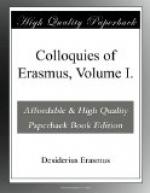Thy Letter was no small Joy. Nothing in Life could happen more delightful than thy Letters. “Although I have sometimes already made Use of this Way, which is not to be pass’d over negligently. For when we would use multum, plurimum, to signify, singulariter, we do it by a contrary Verb.” As, Henry loves you mightily: He loves you with no common Love. Wine pleases me very much: It pleases me not a little. He is a Man of a singular Wit: A Man of no ordinary Wit. He is a Man of admirable Learning: He is a Man not of contemptible Learning. Thomas was born in the highest Place of his Family: Not in the lowest Place. Austin was a most eloquent Man: He was not ineloquent. Carneades the Orator was noble: Not an ignoble, not an obscure Man. “And the like, which are very frequently used.” But the Mention of a Thing so plain is enough: Nor are you ignorant, that we make Use of a two-fold Manner of Speech, of this Kind: For Modesty Sake, especially, if we speak of our selves; also for Amplification Sake. For we use rightly and elegantly, not ungrateful, for very grateful; not vulgarly for singularly.
For Modesty Sake.
I have by my Letters gain’d some Reputation of Learning. I have always made it my Business not to have the last Place in the Glory of Learning. The Examples of Amplification are mention’d before: Now let us return to our own. Nothing ever fell out to me more gratefully, acceptably, than thy Letter. Nothing ever was a greater Pleasure than your Letter. I never took so much Pleasure in any Thing, as in thy most loving Letters. “After this Manner all the before-mention’d Sentences may be vary’d by an Interrogation.” What in Life could be more pleasant than thy Letters? What has happened to me more sweet, than thy Letter? What has ever delighted me like your last Letter? And after this Manner you may vary almost any Sentence.
Ch. What shall we do now?
Au. We will now turn the whole Sentence a little more at large, that we may express one Sentence, by a Circumlocution of many Words.
Ch. Give Examples.
Au. “That which was sometimes express’d by the Noun incredibile, and then again, by the Adverb incredibiliter, we will change the Sentence in some Words.” I can’t express how much I was delighted with your Letters. It is very hard for me to write, and you to believe how much Pleasure your Letter was to me. I am wholly unable to express how I rejoic’d at your Letter. “And so in infinitum: Again, after another Manner. For hitherto we have varied the Sentences by Negations and Interrogations, and in the last Place by Infinitives. Now we will vary by Substantives or Conditionals, after this Manner.” Let me die if any Thing ever was more desired and more pleasant than thy Letters. Let me perish if any Thing ever was more desired, and more pleasant than thy Letter. As God shall judge me, nothing in my whole Life ever happen’d more pleasant than thy Letters. “And also a great many more you may contrive after this Manner.”




